Submissions: 2022 November
-
GeorgeSinanis
- Asternaut
- Posts: 5
- Joined: Sun Nov 06, 2022 7:41 pm
Re: Submissions: 2022 November
Veil Nebula
Image taken from our backyard, in Northampton, UK.
Date: 5/11/2022
28 x 600sec
50 x Darks, Flats and Bias
William Optics RedCat51
ZWO AM5 mount
ASI2600MC Pro
Optolong L-Extreme
32mm Guidescope
ASI290mm mini guidecamera
Integrated and processed with Pixinsight & Topaz.
Image taken from our backyard, in Northampton, UK.
Date: 5/11/2022
28 x 600sec
50 x Darks, Flats and Bias
William Optics RedCat51
ZWO AM5 mount
ASI2600MC Pro
Optolong L-Extreme
32mm Guidescope
ASI290mm mini guidecamera
Integrated and processed with Pixinsight & Topaz.
-
GeorgeSinanis
- Asternaut
- Posts: 5
- Joined: Sun Nov 06, 2022 7:41 pm
Re: Submissions: 2022 November
The Heart and Soul Nebula
Northampton, UK (backyard)
Over two nights (17-18/10/2022)
49 x 600 sec
50 x Darks, Flats and Bias
William Optics RedCat51
ZWO AM5 mount
ASI2600MC Pro
Optolong L-Extreme 2" filter
32mm William Optics guidescope
ASI290mm mini guide camera
Integrated and processed with Pixinsight snd Topaz
Northampton, UK (backyard)
Over two nights (17-18/10/2022)
49 x 600 sec
50 x Darks, Flats and Bias
William Optics RedCat51
ZWO AM5 mount
ASI2600MC Pro
Optolong L-Extreme 2" filter
32mm William Optics guidescope
ASI290mm mini guide camera
Integrated and processed with Pixinsight snd Topaz
Re: Submissions: 2022 November
Mr Gecko
Credit: Andrea Bergamini and Sameer Bharadwaj
A challenging combination of Ha nebula and molecular dust. This one is captured in LHaRGB and processed in PixInsight. About 16 hours in total.
Higher resolution and equipment: https://www.astrobin.com/ie0w92/
Credit: Andrea Bergamini and Sameer Bharadwaj
A challenging combination of Ha nebula and molecular dust. This one is captured in LHaRGB and processed in PixInsight. About 16 hours in total.
Higher resolution and equipment: https://www.astrobin.com/ie0w92/
Re: Submissions: 2022 November
Unified Field
Milkyway in israel bortle 2 skies
Paran Valley
August no moon 2022
Ig - https://www.instagram.com/astroi_levi/
Shot in RGB+ HA in bortle 2 skies in august no moon
saying good bye to the milkyway ,because during the summer, the position towards the sun and the tendency to earth, we look into the center of our Milky Way, while in the winter we look into the side branch of the Milky Way, "out" into space.
Milkyway in israel bortle 2 skies
Paran Valley
August no moon 2022
Ig - https://www.instagram.com/astroi_levi/
Shot in RGB+ HA in bortle 2 skies in august no moon
saying good bye to the milkyway ,because during the summer, the position towards the sun and the tendency to earth, we look into the center of our Milky Way, while in the winter we look into the side branch of the Milky Way, "out" into space.
-
maxifalieres
- Ensign
- Posts: 19
- Joined: Fri Dec 18, 2020 6:39 pm
Re: Submissions: 2022 November
Comet C/2021 A1 Leonard taken the 8th of January of 2022 in Alberti, Buenos Aires Province, Argentina.
To capture this comet i went to the Cielos Albertinos Observatory where they have Bortle 2/3 and point my telescope to the South-West at almost 16° of altitude. Anyway it's visible the sodium tail, all the particules that this comet left behind and also some galaxies far away like PGC 132456 at 450 Million lightyears.
This year we doesn't have a comet like this so I like to share it again to remember it.
I hope next one surprise us!
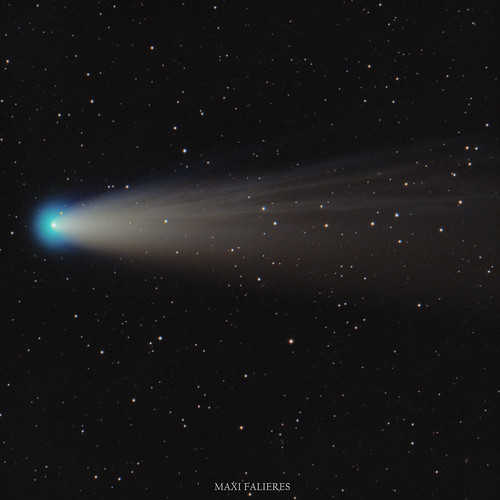
Cometa C/2021 A1 Leonard
by Maxi Falieres, en Flickr
To capture this comet i went to the Cielos Albertinos Observatory where they have Bortle 2/3 and point my telescope to the South-West at almost 16° of altitude. Anyway it's visible the sodium tail, all the particules that this comet left behind and also some galaxies far away like PGC 132456 at 450 Million lightyears.
This year we doesn't have a comet like this so I like to share it again to remember it.
I hope next one surprise us!

Cometa C/2021 A1 Leonard
by Maxi Falieres, en Flickr
Re: Submissions: 2022 November
Moonlit Starlink Launch
SpaceX Starlink launch on October 27, 2022 from the Arizona desert. Taken near Camp Verde, AZ shortly after launch. I scrambled to get my camera ready as we pulled over onto the side of the highway to watch the show! You can see the second stage burn and plume in the upper left, crescent moon near the center, and first stage re-entry in the bottom right.
Link to annotated version: https://jaredseaydesign.com/gallery/ast ... h-from-az/
Canon 6D
70-200mm F/4L @ 87 mm
1/40 sec, ISO 6400
Copyright: Jared Seay
https://jaredseaydesign.com/wp-content/ ... sed_CR.jpg
SpaceX Starlink launch on October 27, 2022 from the Arizona desert. Taken near Camp Verde, AZ shortly after launch. I scrambled to get my camera ready as we pulled over onto the side of the highway to watch the show! You can see the second stage burn and plume in the upper left, crescent moon near the center, and first stage re-entry in the bottom right.
Link to annotated version: https://jaredseaydesign.com/gallery/ast ... h-from-az/
Canon 6D
70-200mm F/4L @ 87 mm
1/40 sec, ISO 6400
Copyright: Jared Seay
https://jaredseaydesign.com/wp-content/ ... sed_CR.jpg
Last edited by bystander on Tue Nov 15, 2022 5:39 am, edited 1 time in total.
Reason: Please, no hot links to images > 500 kb. Uploaded image as an attachment.
Reason: Please, no hot links to images > 500 kb. Uploaded image as an attachment.
-
frustratedphoton
- Asternaut
- Posts: 3
- Joined: Thu Apr 07, 2022 10:25 pm
Re: Submissions: 2022 November
Pacman Nebula
The Pacman Nebula, also known as NGC 281, is ~9500 light years away in the constellation of Cassiopeia. NGC 281 is a bright emission nebula and part of an H II region.
This image was captured, in a Queen Creek (Arizona) Bortle 7 backyard, using a Skywatcher Esprit 150ED telescope. The telescope is mounted on a 10Micron GM2000 HPS II mount. The camera is a ZWO ASI 2600MM Pro using an Antlia SII, OIII, and HA 3nm filters. It was captured over 4 nights (2022-11-04 to 2022-11-07). The images were stacked/processed in Pixinsight and fine-tuning done in Photoshop.
Full image and capture details available here.

The Pacman Nebula, also known as NGC 281, is ~9500 light years away in the constellation of Cassiopeia. NGC 281 is a bright emission nebula and part of an H II region.
This image was captured, in a Queen Creek (Arizona) Bortle 7 backyard, using a Skywatcher Esprit 150ED telescope. The telescope is mounted on a 10Micron GM2000 HPS II mount. The camera is a ZWO ASI 2600MM Pro using an Antlia SII, OIII, and HA 3nm filters. It was captured over 4 nights (2022-11-04 to 2022-11-07). The images were stacked/processed in Pixinsight and fine-tuning done in Photoshop.
Full image and capture details available here.

-
tommasostella
- Ensign
- Posts: 60
- Joined: Mon Nov 11, 2019 4:34 pm
Re: Submissions: 2022 November
The Lobster Claw nebula (SH2-157)
https://www.facebook.com/tommaso.m.stella
Copyright: Tommaso Stella
From: Taranto (Italy)
Technical data
Sky: Bortle 6, SQM 20.4
Lights: 36x600s (6h total integration)
Telescope: TS PhotoLine Apochromatic FPL53 Triplet 102/564
Camera: Astroshop Omegon veTEC571C
Mount: Skywatcher AZ-EQ6 GT
Filters: Optolong Astronomy Filter L-Ultimate
Processing: DeepSkyStacker, Photoshop CC, PixInsight
FullHD Res:
https://www.astrotomax.space/public/Sh2 ... llaWEB.jpg
https://www.facebook.com/tommaso.m.stella
Copyright: Tommaso Stella
From: Taranto (Italy)
Technical data
Sky: Bortle 6, SQM 20.4
Lights: 36x600s (6h total integration)
Telescope: TS PhotoLine Apochromatic FPL53 Triplet 102/564
Camera: Astroshop Omegon veTEC571C
Mount: Skywatcher AZ-EQ6 GT
Filters: Optolong Astronomy Filter L-Ultimate
Processing: DeepSkyStacker, Photoshop CC, PixInsight
FullHD Res:
https://www.astrotomax.space/public/Sh2 ... llaWEB.jpg
-
Herbert_Walter
- Ensign
- Posts: 18
- Joined: Sat Nov 05, 2022 2:56 pm
Re: Submissions: 2022 November
What a mystical image - the open star cluster ESO 245-09 above the brightly glowing star 'psi Phoenix'.
More infos: https://www.skypixels.at/ocl_eso_245-09.html
Re: Submissions: 2022 November
Timelape: The Exploding Crab Nebula
Timelapse Video: https://www.kentbiggs.com/images/planetaries/M1v.htm
Full Image Animations: https://www.kentbiggs.com/images/planetaries/M1-3.htm
It is rare and exciting to see any changes in astronomical objects outside of our solar system. However, incredibly, this time lapse animation is two images taken exactly 13 years apart. Clearly visible is the expansion of the red glowing filaments of ionized helium and hydrogen, as well as the swirling blue-white cloudy material illuminated by synchrotron radiation. Also note the proper motion movement of the yellow-orange star in the lower left corner of the image. Many more details including animations and annotations available here
Hover over below image to see the 13-year timelapse: Below is the full frame image used for the 13-year timelapse frame #2. Note also the asteroid captured in its own timelapse as it “blinked” across the many 10-minute exposures! Hover over below image to see annotations. Full size image: https://www.kentbiggs.com/images/planet ... RGB_4K.jpg
Total integration time for both images: ~18 hours. Copyright Kent E. Biggs
Clear skies,
www.kentbiggs.com
Houston, Texas
Timelapse Video: https://www.kentbiggs.com/images/planetaries/M1v.htm
Full Image Animations: https://www.kentbiggs.com/images/planetaries/M1-3.htm
It is rare and exciting to see any changes in astronomical objects outside of our solar system. However, incredibly, this time lapse animation is two images taken exactly 13 years apart. Clearly visible is the expansion of the red glowing filaments of ionized helium and hydrogen, as well as the swirling blue-white cloudy material illuminated by synchrotron radiation. Also note the proper motion movement of the yellow-orange star in the lower left corner of the image. Many more details including animations and annotations available here
Hover over below image to see the 13-year timelapse: Below is the full frame image used for the 13-year timelapse frame #2. Note also the asteroid captured in its own timelapse as it “blinked” across the many 10-minute exposures! Hover over below image to see annotations. Full size image: https://www.kentbiggs.com/images/planet ... RGB_4K.jpg
Total integration time for both images: ~18 hours. Copyright Kent E. Biggs
Clear skies,
www.kentbiggs.com
Houston, Texas
-
Efrain Morales
- Commander
- Posts: 507
- Joined: Fri Oct 22, 2010 8:15 pm
- AKA: Jaicoa
- Location: Aguadilla, Puerto Rico
- Contact:
ISS-Neptune- Nov.14th
International Space Station passing by the planet Neptune on November 14th.
Re: Submissions: 2022 November
North America Nebula and Pelican Nebula in HOO
Revisited the North America Nebula and Pelican Nebula data and applied more refined processing techniques using PI to render a proper HOO image of the target.
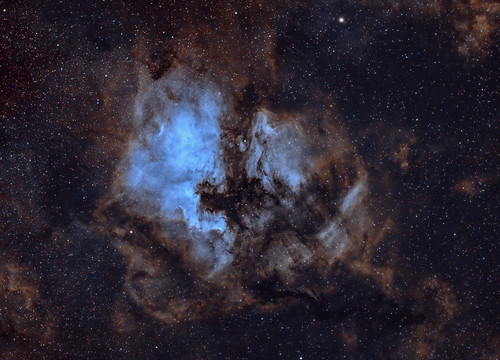 North American Nebula - Pelican Nebula - HOO by Ahmed Waddah, on Flickr
North American Nebula - Pelican Nebula - HOO by Ahmed Waddah, on Flickr
William Optics Redcat 51
Nikon Z6II (modified)
iOptron SkyGuider
Antlia ALP-T Dual Band 5nm 2"
31×300″
Total Integration: 2h 35′
https://www.astrobin.com/emn5tn/
Facebook: https://www.facebook.com/waddah.photography
Astrobin: https://www.astrobin.com/users/WolfHeart/
IG: https://www.instagram.com/waddahphotography/
Revisited the North America Nebula and Pelican Nebula data and applied more refined processing techniques using PI to render a proper HOO image of the target.
 North American Nebula - Pelican Nebula - HOO by Ahmed Waddah, on Flickr
North American Nebula - Pelican Nebula - HOO by Ahmed Waddah, on FlickrWilliam Optics Redcat 51
Nikon Z6II (modified)
iOptron SkyGuider
Antlia ALP-T Dual Band 5nm 2"
31×300″
Total Integration: 2h 35′
https://www.astrobin.com/emn5tn/
Facebook: https://www.facebook.com/waddah.photography
Astrobin: https://www.astrobin.com/users/WolfHeart/
IG: https://www.instagram.com/waddahphotography/
-
vanamonde81
- Science Officer
- Posts: 143
- Joined: Fri Apr 12, 2013 7:46 am
Re: Submissions: 2022 November
Lunar Eclipse Sequence
Copyright: György Soponyai
On the evening of 2022-11-08 I successfully observed and photographed the total Lunar eclipse from the capital of Japan. Photos were taken in every 15 minutes with the best equipment I was able to pack into a hand baggage.

2022-11-08 Tokyo, Japan
Canon EOS 5D Mark II + Tamron EF 150-600 + 2x extender @1200mm
Copyright: György Soponyai
On the evening of 2022-11-08 I successfully observed and photographed the total Lunar eclipse from the capital of Japan. Photos were taken in every 15 minutes with the best equipment I was able to pack into a hand baggage.

2022-11-08 Tokyo, Japan
Canon EOS 5D Mark II + Tamron EF 150-600 + 2x extender @1200mm
Re: Submissions: 2022 November
M78 reflection nebula in Orion using 16 hours of total integration time.
Skywatcher Esprit 100ed
ZWO AM5
ZWO OAGL
ZWO ASI290mm mini guide
ZWO EAF
ZWO ASI2699mcpro
L-enhance 10 hours 10-min
No Filter 6 hours 5-minutes
40 dark, flat, and dark flat
DSS, PixInsight, Gimp
Bortle 7, San Jose, CA
https://www.astrobin.com/lt5h3n/
Skywatcher Esprit 100ed
ZWO AM5
ZWO OAGL
ZWO ASI290mm mini guide
ZWO EAF
ZWO ASI2699mcpro
L-enhance 10 hours 10-min
No Filter 6 hours 5-minutes
40 dark, flat, and dark flat
DSS, PixInsight, Gimp
Bortle 7, San Jose, CA
https://www.astrobin.com/lt5h3n/
Last edited by bystander on Thu Nov 17, 2022 2:43 pm, edited 1 time in total.
Reason: Please, no hot links to images > 500 kb. Uploaded image as an attachment.
Reason: Please, no hot links to images > 500 kb. Uploaded image as an attachment.
-
Galactic-Hunter
- Ensign
- Posts: 26
- Joined: Wed Jul 08, 2020 3:13 pm
Re: Submissions: 2022 November
Revealing the Hidden Beauty around the Double Cluster
The Double Cluster in Perseus is a popular target among amateur astrophotographers, it is an easy object to capture, and it is most of the time imaged in RGB.
I stumbled upon wide field pictures of the area and saw that there was a lot of HA signal behind and all around the clusters. I decided to give it a go with a focal length of 655mm, which hasn’t been done much apparently.
I spent one night capturing R, G, and B signal. Then I spent 3 extra nights (20 hours) imaging but this time with a hydrogen alpha filter. Even with 20 hours of exposure in HA, itt was difficult to bring out the gas during processing because it is still relatively faint in this area of the sky. This is what I was able to achieve. You can see the beautiful Double Cluster, and an incredible amount of HA gas behind and around.
Telescope: SVX130
Camera: QHY600M
Filters: RGBHa
Mount: 10Micron GM1000HPS
Credit:
Antoine Grelin
http://www.galactic-hunter.com/
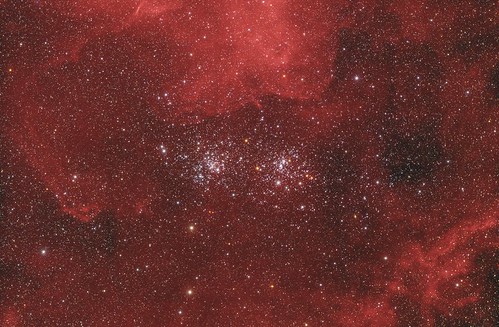 Double Cluster with 20 hours of HA
Double Cluster with 20 hours of HA
The Double Cluster in Perseus is a popular target among amateur astrophotographers, it is an easy object to capture, and it is most of the time imaged in RGB.
I stumbled upon wide field pictures of the area and saw that there was a lot of HA signal behind and all around the clusters. I decided to give it a go with a focal length of 655mm, which hasn’t been done much apparently.
I spent one night capturing R, G, and B signal. Then I spent 3 extra nights (20 hours) imaging but this time with a hydrogen alpha filter. Even with 20 hours of exposure in HA, itt was difficult to bring out the gas during processing because it is still relatively faint in this area of the sky. This is what I was able to achieve. You can see the beautiful Double Cluster, and an incredible amount of HA gas behind and around.
Telescope: SVX130
Camera: QHY600M
Filters: RGBHa
Mount: 10Micron GM1000HPS
Credit:
Antoine Grelin
http://www.galactic-hunter.com/
 Double Cluster with 20 hours of HA
Double Cluster with 20 hours of HA-
H-alpha
Re: Submissions: 2022 November
Hi all,
I am following Mars during the last couple of months as it is approaching the Earth for its opposition, in order to create a full map of the planet.
During the last days I was impressed by the speed of daily changes in its North Polar Hood, as well the appearance of clouds in the southern hemisphere, so I tried to represent them in a short animation that follows:
 2022-11-10 to 13, Animation of Mars' North Polar Hood evolution, C14 Edge, Barlow 2.1x, ASI 290 by H- Alpha, on Flickr
2022-11-10 to 13, Animation of Mars' North Polar Hood evolution, C14 Edge, Barlow 2.1x, ASI 290 by H- Alpha, on Flickr
Best wishes,
Alexandros
I am following Mars during the last couple of months as it is approaching the Earth for its opposition, in order to create a full map of the planet.
During the last days I was impressed by the speed of daily changes in its North Polar Hood, as well the appearance of clouds in the southern hemisphere, so I tried to represent them in a short animation that follows:
 2022-11-10 to 13, Animation of Mars' North Polar Hood evolution, C14 Edge, Barlow 2.1x, ASI 290 by H- Alpha, on Flickr
2022-11-10 to 13, Animation of Mars' North Polar Hood evolution, C14 Edge, Barlow 2.1x, ASI 290 by H- Alpha, on FlickrBest wishes,
Alexandros
SH2-82 Little Cocoon Nebula
September 2021/August 2022
Location: San Romualdo - Ravenna (Italy)
Tecnosky Apo 130/900
Avalon M1 - QHY5III 174M on OAG Celestron
CCD QSI 520wsi cooled -7
Astrodon RGB GenII I-series e Narrowband 5nm filters
HA-RGB: H-alpha 27x10min, R 28x5min, G 29x5min, B 29x5min
Acquired with: MaximDL5 - Calibrated with Dark, Bias and Flat.
Processed with: Astroart8, Starnet2, StarTools1.8, Paint Shop Pro2022.
Cristina Cellini
Location: San Romualdo - Ravenna (Italy)
Tecnosky Apo 130/900
Avalon M1 - QHY5III 174M on OAG Celestron
CCD QSI 520wsi cooled -7
Astrodon RGB GenII I-series e Narrowband 5nm filters
HA-RGB: H-alpha 27x10min, R 28x5min, G 29x5min, B 29x5min
Acquired with: MaximDL5 - Calibrated with Dark, Bias and Flat.
Processed with: Astroart8, Starnet2, StarTools1.8, Paint Shop Pro2022.
Cristina Cellini
-
astrohokie
- Ensign
- Posts: 36
- Joined: Thu Oct 14, 2021 10:32 pm
Re: Submissions: 2022 November
Soul Nebula
Copyright: Mark Hoffman, Instagram: @Mark_Hoffman_Photography
https://www.flickr.com/photos/194543639@N07/
https://www.instagram.com/mark_hoffman_photography/
"The Soul Nebula is about 100 light years across and has an estimated age of 1 million years. It contains several small open star clusters. IC 1848 is embedded in the body of the nebula, while the clusters CR 34, 632 and 634 can be seen in the head. Small emission nebulae IC 1871, 670 and 669 are located just next to the Soul Nebula. The Soul Nebula is being carved out by the stellar winds from the stars embedded within it, a process that leaves behind large pillars of material pointing inwards. These pillars are very dense and have stars forming at their tips. Each pillar spans about 10 light years."
With and without stars.

Soul_Nebula_1422mm_SHO by mark h, on Flickr
https://live.staticflickr.com/65535/525 ... 8a30_o.png
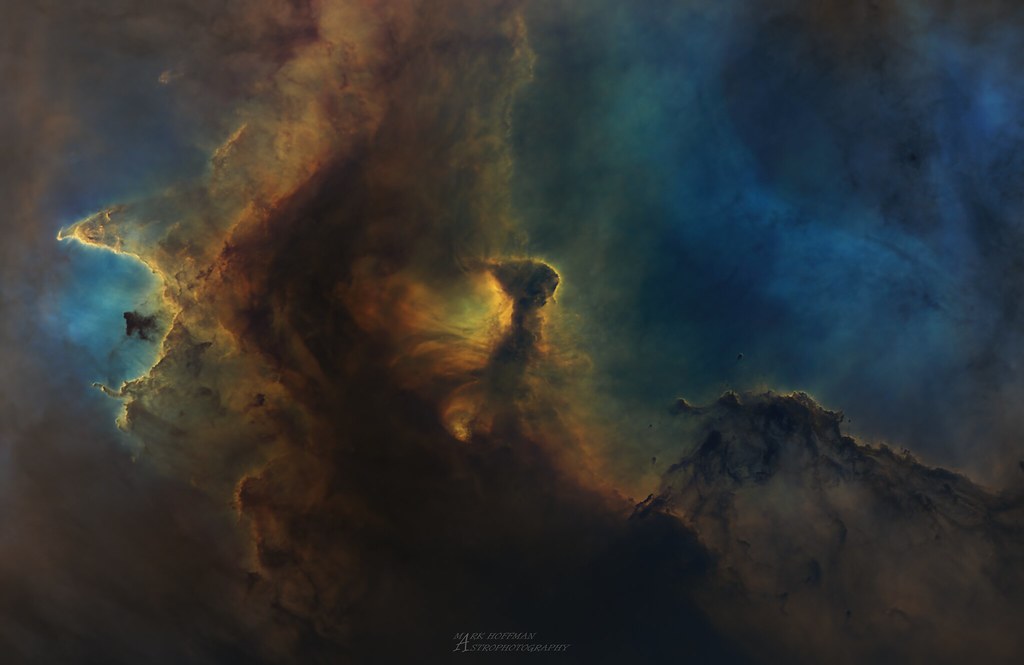
Soul_Nebula_1422mm_SHO_starless by mark h, on Flickr
https://live.staticflickr.com/65535/525 ... d57f_o.png
Equipment/Capture Details:
Soul Nebula (IC 1848)
Celestron Edge HD8 w/ 0.7x reducer
EQ6R-Pro
Celestron Autofocuser
ZWO ASI 174MM
ASI 294MM Pro
ASI 7 position EFW
1.25in Chroma 5nm Ha, 3nm O3, 3nm S2 filters
Total Integration Time = 38 hours
Ha Integration Time = 91 * 600sec
O3 Intergration Time = 68 * 600sec
S2 Integration Time = 73 * 600sec
Virginia, USA
Bortle 7
Capture dates: 10/18/2022, 10/19/2022, 10/20/2022, 10//2022, 10/22/2022, 10/2\82/2022, 10/30/2022, 11/1/2022, 11/2/2022, 11/3/2022, 11/4/2022, 11/5/2022, 11/13/2022, 11/14/2022, 1/17/2022, 11/18/2022
SHO palette using LRGB combo in Pixinsight with curves, saturation, deconvolution, StarXterminator, NoiseXterminator, unsharp mask.
Copyright: Mark Hoffman, Instagram: @Mark_Hoffman_Photography
https://www.flickr.com/photos/194543639@N07/
https://www.instagram.com/mark_hoffman_photography/
"The Soul Nebula is about 100 light years across and has an estimated age of 1 million years. It contains several small open star clusters. IC 1848 is embedded in the body of the nebula, while the clusters CR 34, 632 and 634 can be seen in the head. Small emission nebulae IC 1871, 670 and 669 are located just next to the Soul Nebula. The Soul Nebula is being carved out by the stellar winds from the stars embedded within it, a process that leaves behind large pillars of material pointing inwards. These pillars are very dense and have stars forming at their tips. Each pillar spans about 10 light years."
With and without stars.

Soul_Nebula_1422mm_SHO by mark h, on Flickr
https://live.staticflickr.com/65535/525 ... 8a30_o.png

Soul_Nebula_1422mm_SHO_starless by mark h, on Flickr
https://live.staticflickr.com/65535/525 ... d57f_o.png
Equipment/Capture Details:
Soul Nebula (IC 1848)
Celestron Edge HD8 w/ 0.7x reducer
EQ6R-Pro
Celestron Autofocuser
ZWO ASI 174MM
ASI 294MM Pro
ASI 7 position EFW
1.25in Chroma 5nm Ha, 3nm O3, 3nm S2 filters
Total Integration Time = 38 hours
Ha Integration Time = 91 * 600sec
O3 Intergration Time = 68 * 600sec
S2 Integration Time = 73 * 600sec
Virginia, USA
Bortle 7
Capture dates: 10/18/2022, 10/19/2022, 10/20/2022, 10//2022, 10/22/2022, 10/2\82/2022, 10/30/2022, 11/1/2022, 11/2/2022, 11/3/2022, 11/4/2022, 11/5/2022, 11/13/2022, 11/14/2022, 1/17/2022, 11/18/2022
SHO palette using LRGB combo in Pixinsight with curves, saturation, deconvolution, StarXterminator, NoiseXterminator, unsharp mask.
Last edited by bystander on Sun Nov 20, 2022 4:45 am, edited 1 time in total.
Reason: Please, no hot links to images > 500 kb. Substituted smaller images.
Reason: Please, no hot links to images > 500 kb. Substituted smaller images.
Re: Submissions: 2022 November
Venus
Copyright: Marco Ludwig
This image shows Venus setting on April 19, 2020 on the outskirts of Neumunster in northern Germany.
https://astronomietag.de/wp-content/upl ... es2400.jpg
www.sternwarte-nms.de
Copyright: Marco Ludwig
This image shows Venus setting on April 19, 2020 on the outskirts of Neumunster in northern Germany.
https://astronomietag.de/wp-content/upl ... es2400.jpg
www.sternwarte-nms.de
Last edited by bystander on Sun Nov 20, 2022 4:32 pm, edited 1 time in total.
Reason: Please, no hot links to images > 500 kb. Uploaded image as an attachment.
Reason: Please, no hot links to images > 500 kb. Uploaded image as an attachment.
- Sergio
- Friendly Neighborhood Astrophotographer
- Posts: 100
- Joined: Mon Aug 29, 2011 5:26 pm
- Location: Buenos Aires, Argentina
- Contact:
Re: Submissions: 2022 November
Sharpless 2 16 (aka Gum 70) & Collinder 347
Sharpless 2 16 is located in the constellation of Sagittarius in its border limits close to Scorpius and Ophiuchus.
Found little information about this objet so I quote the Galaxy Map data (*)
Sh 2-16 is part of the Sh 2-15 to Sh 2-20 complex of HII regions located in the Sgr OB5 association in the Sagittarius arm. It appears to be ionised by the O9.5 V star TYC 6840-271-1
Taken from Buenos Aires suburbs, Argentina bortle 8 skies
Higher resolution image at
http://www.baskies.com.ar/PHOTOS/SHARPL ... B%20HR.htm
(*) http://galaxymap.org/
Best Regards
Sergio
Sharpless 2 16 is located in the constellation of Sagittarius in its border limits close to Scorpius and Ophiuchus.
Found little information about this objet so I quote the Galaxy Map data (*)
Sh 2-16 is part of the Sh 2-15 to Sh 2-20 complex of HII regions located in the Sgr OB5 association in the Sagittarius arm. It appears to be ionised by the O9.5 V star TYC 6840-271-1
Taken from Buenos Aires suburbs, Argentina bortle 8 skies
Higher resolution image at
http://www.baskies.com.ar/PHOTOS/SHARPL ... B%20HR.htm
(*) http://galaxymap.org/
Best Regards
Sergio
-
Guest
Re: Submissions: 2022 November
A deep 11.2 hour exposure of the Pleiades.
Technical details are as follows:
Paramount ME
Celestron C14 Edge HD
Starizona Hyperstar 14 V4
Optolong L-Pro Luminance filter
ZWO ASI 6200MC Color Camera
336x120sec exposures
Processed in APP and Lightroom
Aurora HDR
 Pleiades 11.5 Hours by Blake Estes, on Flickr
Pleiades 11.5 Hours by Blake Estes, on Flickr
Technical details are as follows:
Paramount ME
Celestron C14 Edge HD
Starizona Hyperstar 14 V4
Optolong L-Pro Luminance filter
ZWO ASI 6200MC Color Camera
336x120sec exposures
Processed in APP and Lightroom
Aurora HDR
 Pleiades 11.5 Hours by Blake Estes, on Flickr
Pleiades 11.5 Hours by Blake Estes, on Flickr-
Robservatory
- Ensign
- Posts: 28
- Joined: Thu Jul 28, 2022 3:26 pm
Re: Submissions: 2022 November
Sol - Nov 18th, 2022
Sol on the morning of November 18th at 11am PST from Vancouver, Canada. There are filaments, sunspots, and a prominence all performing their nuclear dance together.
Telescope: Daystar 60DS
Camera: ASI290MM
Mount: SW Solar Scout
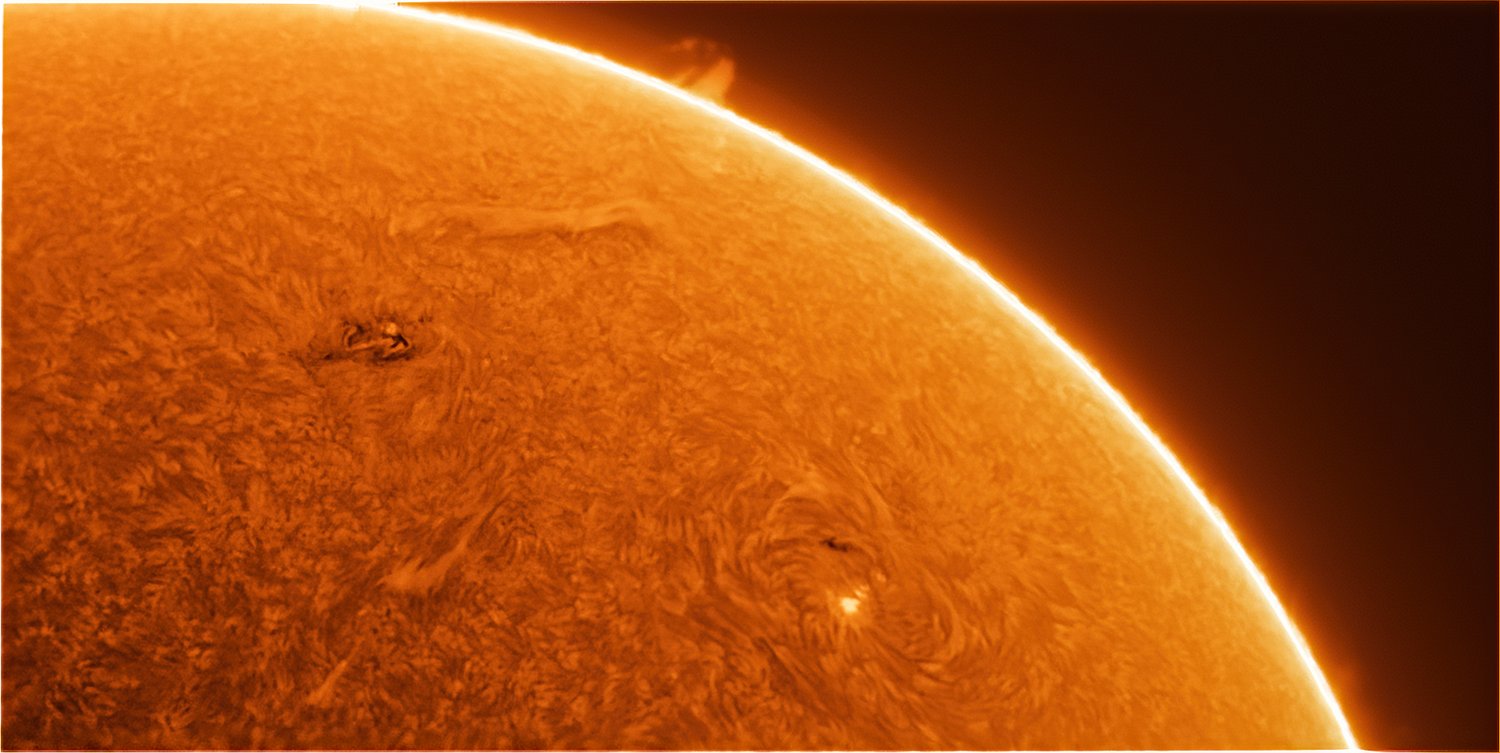
Sol on the morning of November 18th at 11am PST from Vancouver, Canada. There are filaments, sunspots, and a prominence all performing their nuclear dance together.
Telescope: Daystar 60DS
Camera: ASI290MM
Mount: SW Solar Scout

-
Robservatory
- Ensign
- Posts: 28
- Joined: Thu Jul 28, 2022 3:26 pm
Re: Submissions: 2022 November
NGC 281 - The Pacman Nebula
The Pacman Nebula imaged from the Trottier Observatory on Tuesday November 15th/16th, 2022. I used the mighty CDK700 to reach deep into the constellation Cassiopeia to capture this close up view of the Pacman Nebula. I wonder if he was on his way to eat the Ghost of Cassiopeia?!
Telescope: CDK700
Camera: FLI ProLine 16803
Filters: Astrodon 3nm
Processing: APP and Photoshop
Integration: 5 Hours
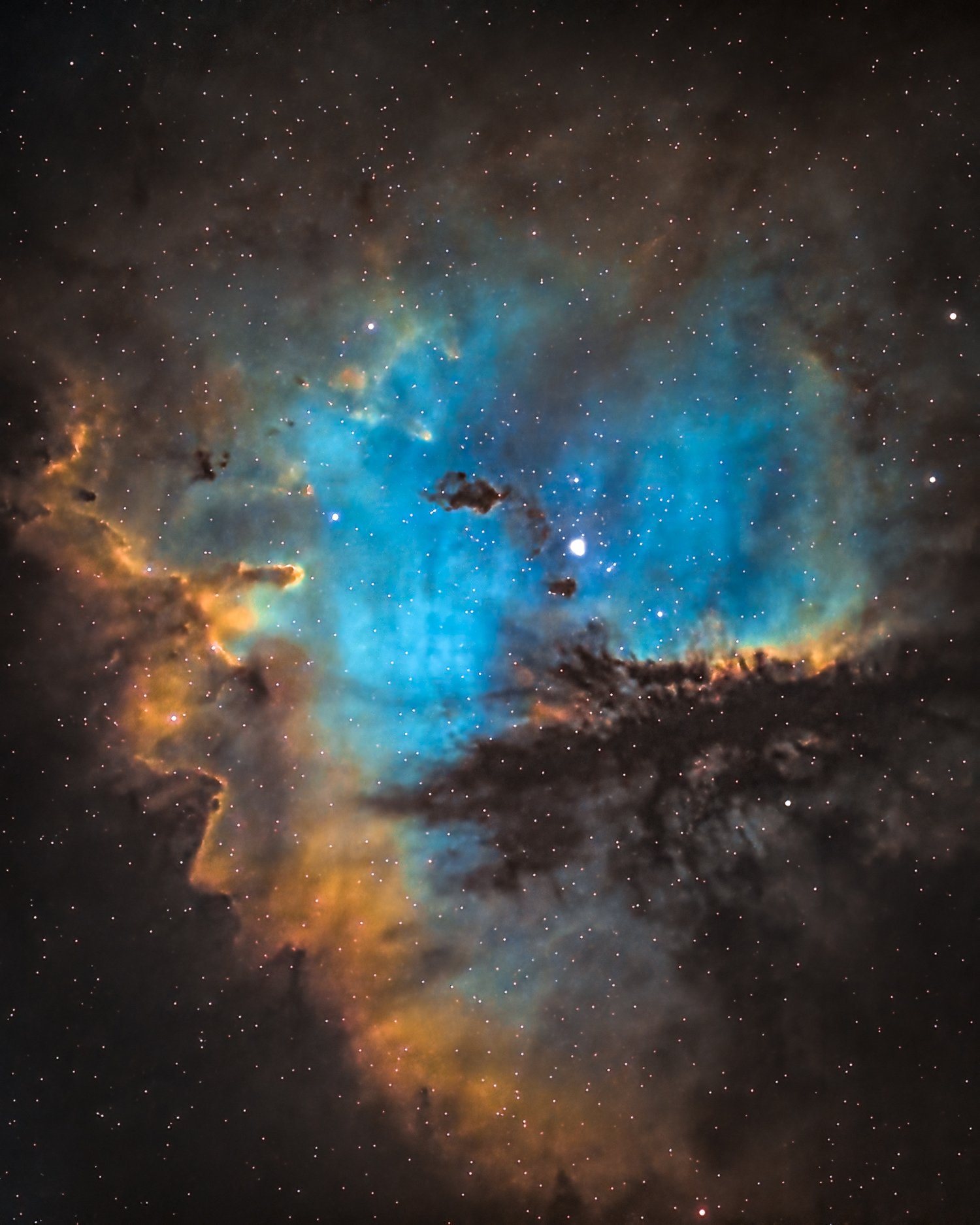
The Pacman Nebula imaged from the Trottier Observatory on Tuesday November 15th/16th, 2022. I used the mighty CDK700 to reach deep into the constellation Cassiopeia to capture this close up view of the Pacman Nebula. I wonder if he was on his way to eat the Ghost of Cassiopeia?!
Telescope: CDK700
Camera: FLI ProLine 16803
Filters: Astrodon 3nm
Processing: APP and Photoshop
Integration: 5 Hours

-
Robservatory
- Ensign
- Posts: 28
- Joined: Thu Jul 28, 2022 3:26 pm
Re: Submissions: 2022 November
M33 - The Triangulum Galaxy
The Triangulum Galaxy captured over 6 nights from the Bortle 8/9 skies of downtown Vancouver, Canada. I wanted to know if it was even possible, and it actually turned out way better than I expected! The light from this neighbouring galaxy travelled almost 3 million years to get here, so it was only right that I treated it to 1895 exposures in my best attempt to do its beauty justice.
Telescope: SW Quattro 150P
Camera: ASI183MM Pro
Filters: Antlia LRGB Pro, Antlia 3nm ha, and Optolong L-Pro
Mount: ZWO AM5
Processing: APP and Photoshop
Total Integration: 39.35 Hours
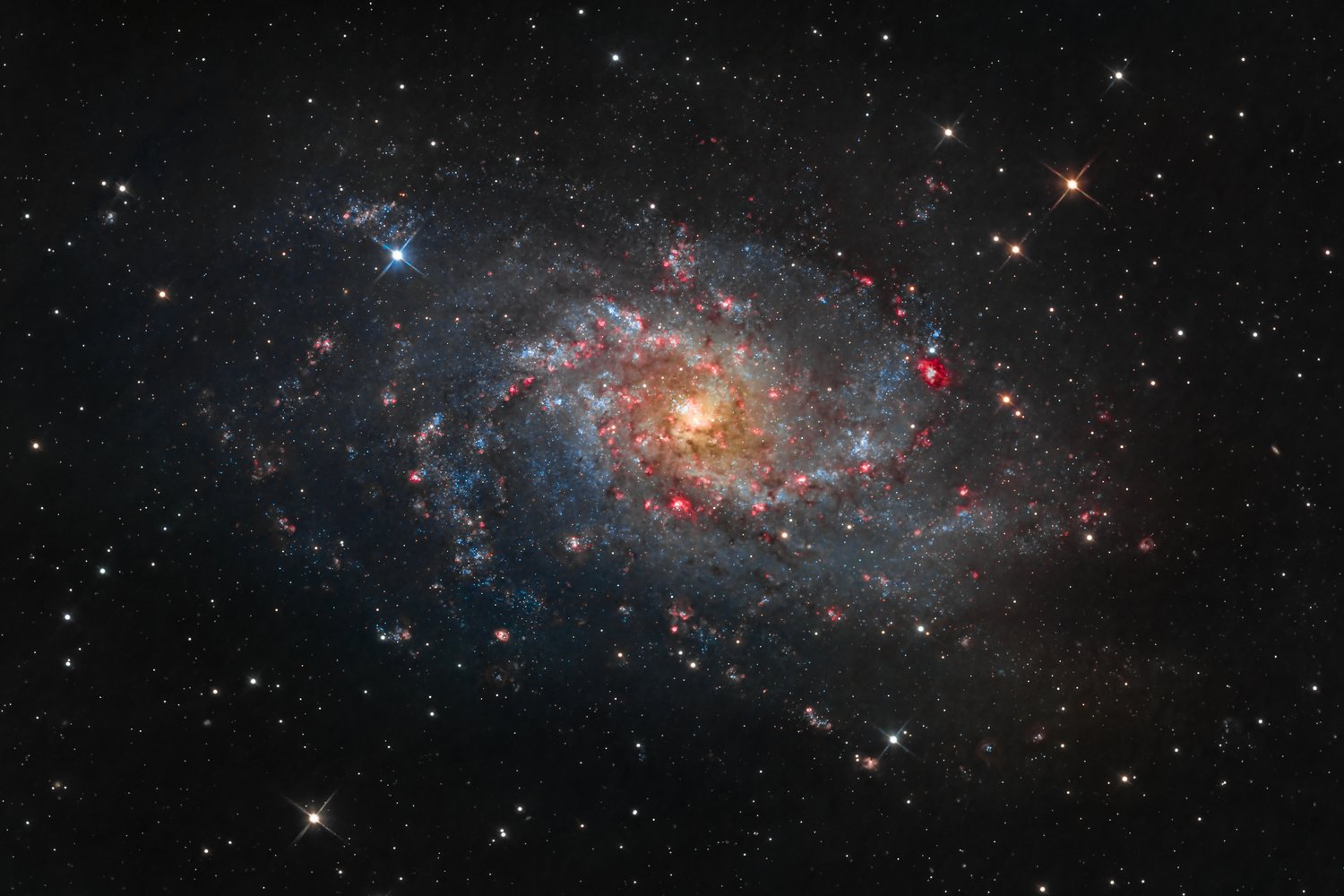
The Triangulum Galaxy captured over 6 nights from the Bortle 8/9 skies of downtown Vancouver, Canada. I wanted to know if it was even possible, and it actually turned out way better than I expected! The light from this neighbouring galaxy travelled almost 3 million years to get here, so it was only right that I treated it to 1895 exposures in my best attempt to do its beauty justice.
Telescope: SW Quattro 150P
Camera: ASI183MM Pro
Filters: Antlia LRGB Pro, Antlia 3nm ha, and Optolong L-Pro
Mount: ZWO AM5
Processing: APP and Photoshop
Total Integration: 39.35 Hours





